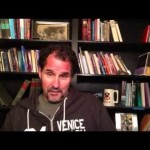We run our website the way we wished the whole internet worked: we provide high quality original content with no ads. We are funded solely by your direct support. Please consider supporting this project.

Making Room for Doubt and Questions in Our Youth Curriculum
This article from a Christianity Today blog was sent to us from a reader (Thanks Laura!) reflecting on the need for making space for doubt and questions in our youth curriculum.
From the article:
In our Sticky Faith research, geared to help young people develop a Christian faith that lasts, a common narrative emerged: When young people asked tough questions about God at church, often during elementary or middle school, they were told by well-meaning church leaders and teachers, “We don’t ask those sorts of questions about God here.” While they rarely storm out of the church like Jobs did, they end up believing that the church is not big enough to handle their tough questions, and thus neither is God.
According to our research at FYI, this suppression of doubt can sabotage a young person’s faith. Contrary to what many of us might believe, students who feel the most free to express doubt and discuss their personal problems actually exhibit more internal and external faith indicators in high school and college. Doubt in and of itself isn’t toxic. It’s unexpressed doubt that becomes toxic.
Image by Victor Bezrukov. Sourced via Flickr.
Related Reading

Speaking of Doubt
Xava du via Compfight As long as we’re on the topic of faith and doubt, here’s an excellent piece by Richard Beck on The Gifts and Benefits of Doubt. Are you struggling with doubt and feeling like a spiritual loser for it? We think you’ll appreciate Beck’s insight on this. From the article: The assumption…

Video Q&A: Do you think Jehovah’s Witnesses and Mormons are saved?
Does Greg believe that everyone goes to Heaven regardless of their beliefs? Find out here.

How do you respond to Genesis 49:10?
“The scepter will not depart from Judah, nor the ruler’s staff from between his feet, until he to whom it belongs shall come and the obedience of the nations be his.” In Exodus 32:10-14 God threatens to destroy the Israelites and start over with Moses. But Moses intercedes and God changes his mind. For Open…

Are Christians supposed to tithe?
Question: I and my husband have become increasingly uncomfortable with the many sermons on tithing we’ve been recently hearing at our church. Our pastor insists we tithe 10% to the church regardless of what else we give to other ministries. It seems like it has been reduced to a formula: Give ten percent and be…

How do you respond to Romans 8:29-30?
Question: Romans 8:29–30 says that everyone God foreknew he predestined. You deny both that God foreknows and predestines individual believers. So this verse seems to refute your open view. Answer: First, as many exegetes have noted, the sort of “knowing” Paul intends in this passage is not merely intellectual knowledge, but rather an intimate affection.…

Is homosexual love without homoerotic behavior okay for a Christian?
Question: You may find this to be an odd question, but is it possible for two Christians of the same gender to remain a couple if they do not engage in sex? My partner and I love each other but our study of Scripture convinces us that having sex is wrong. Now, sex was never…
